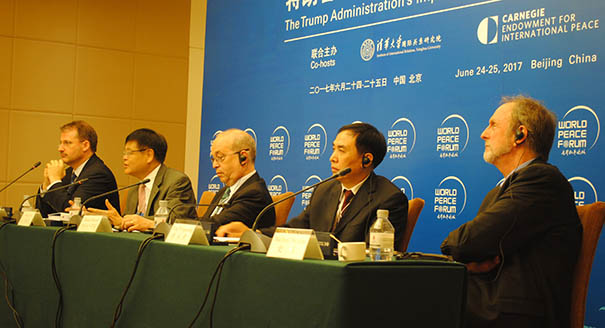Registration
You will receive an email confirming your registration.
Five months into his term, President Trump has altered the direction of U.S. foreign policy as he pursues his “America First” agenda. The administration’s decision to withdraw from the Trans-Pacific Partnership and rescind its commitment to the Paris Climate Agreement has called into question America’s role in the existing world order. In this global context, China has put itself forward as a strong advocate for interconnectivity and globalization, seen most recently through the launch of its Belt and Road Initiative and Asian Infrastructure Investment Bank. How will Trump’s “America First” policy change the global landscape over the course of his administration? Will China be able to step up its role and make greater international contributions where the U.S. withdraws under President Trump’s leadership? What actions might China take in the interim to strengthen its influence in the Asia-Pacific region? And how will U.S.-China relations be impacted by these changes and by the pressing security and economic issues now front and center in the bilateral relationship?
The Carnegie Endowment for International Peace co-hosted a panel at the sixth annual World Peace Forum—organized by Tsinghua University and the Chinese People’s Institute of Foreign Affairs—to discuss the future of U.S. foreign policy under Trump. The Carnegie–Tsinghua Center’s Director Paul Haenle chaired the panel and moderated the discussion between Daniel Russel, U.S. assistant secretary of state for East Asia and Pacific Affairs, Peking University’s Wang Jisi, Michael Swaine from the Carnegie Endowment for International Peace, and Tang Yongsheng of the Institute for Strategic Studies and Teaching at the National Defense University.
Discussion Highlights
- Trends in the Trump Administration: The panelists agreed that President Trump has subverted the traditional cornerstones of U.S. policy, including the promotion of multilateralism, free trade, and liberal political values. As one panelist noted, the new administration is pursuing a more reactive, transactional, bilateral, and protective approach that narrowly focuses on benefits for the United States. While unpredictability and the absence of a clear foreign policy agenda marked the unconventional start of his administration, the panelists argued Trump has delivered on some of his campaign’s promises, such as withdrawing from the Paris climate agreement.
- Declining U.S. Influence: Given the current uncertainty and turmoil around the world, panelists said that the need to strengthen the U.S.-China relationship is becoming even more pressing. Although one panelist said it is currently unclear whether bilateral ties will move in a positive or negative direction, they argued that the two countries will continue to share security interests, such as containing North Korea. A discussant suggested that the United States is seeing a decline in its soft power abroad, primarily caused by the new administration’s myopic behavior. The weakening of U.S. influence is perceptible, the panelist said, in Europe and the Asia-Pacific, with Japan and South Korea deepening ties to regional multilateral organizations. Under these circumstances, China might increase its influence as an alternative power to the United States, but panelists concluded that this is not a realistic scenario. China, they argued, places an emphasis on predictability and would likely be unwilling to replace the United States and subvert the existing international order.
- Uncertain Future World Order: While it is still early in the Trump administration, panelists said that policymakers can already identify some clear trends in the global order under the new U.S. leadership. One panelist said that many U.S. relationships, such as those with Russia and China, are likely to neither improve nor deteriorate, but will rather remain stable over the next three years. Today’s world order, discussants said, is driven by two opposite forces: one toward a multipolar and integrated world, and the other one toward disarray and stress within the international system. Any large change is unlikely, but a panelist argued that the world could see a moderate alteration in the status quo.
Daniel Russel
Daniel Russel was the assistant secretary of state for East Asian and Pacific Affairs and is a senior fellow at the Asia Society.
Wang Jisi
Wang Jisi is dean of the School of International Studies at Peking University.
Michael D. Swaine
Michael D. Swaine is a senior fellow at the Carnegie Endowment for International Peace and one of the most prominent American analysts in Chinese security studies.
Tang Yongsheng
Tang Yongsheng is the deputy director of the Institute for Strategic Studies and Teaching at the National Defense University.
Paul Haenle
Paul Haenle is the director of the Carnegie–Tsinghua Center for Global Policy based at Tsinghua University in Beijing.
